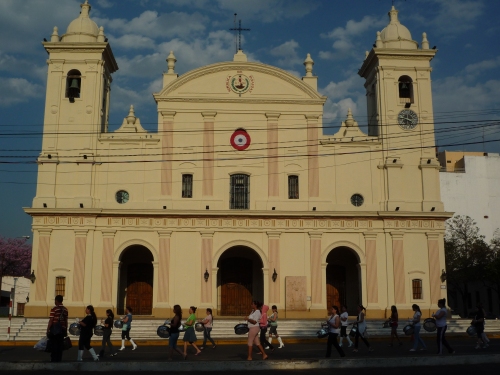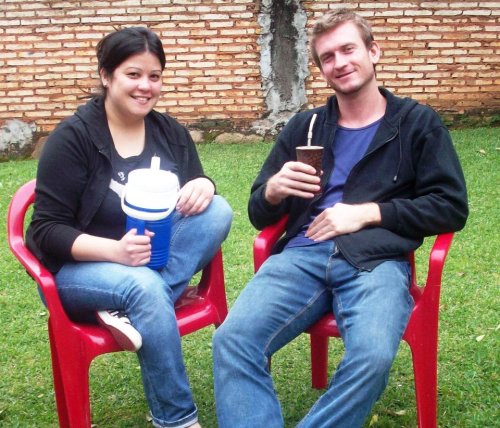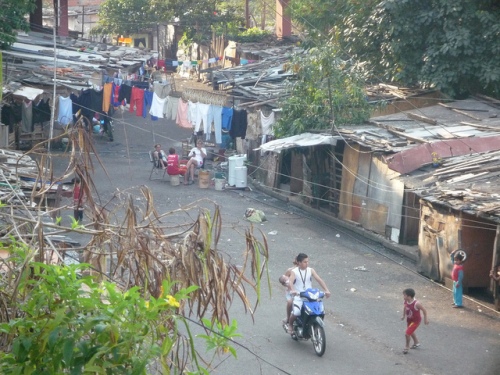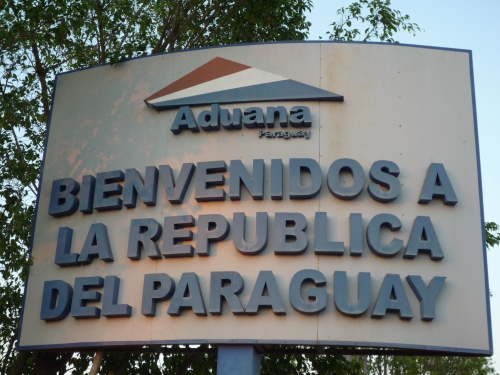
Church in downtown Asunción, Paraguay
FOREWORD: With my bike gear sold and one bag packed, I’m currently en route to the United States, to end destination San Francisco, California after a five-day layover in Lima, Peru. But before I return to all that is routine and comfortable in my home country my mind insists that the remote and complex nation of Paraguay make a blog appearance.
From the northern Argentine border near Formosa to the multi-cultural tri-border at Iguazu Falls, my five days of zig-zagging bus travel were much too quick to gain any deep understanding of this land-locked island within the South American continent, but I did have a lot of fun skimming across its surface. Below are a few descriptions of my first day in Paraguay, each written in reverse chronological order and purposefully limited to one paragraph.

Nardi and Trevor in Asunción, Paraguay
August 13th [9:28pm – Grilling with friend Nardi and her parents] – Tonight I gained a family and two new friends: the Spanish-only Nardi version, the same who picked me up in her used Mercedes hours after I Facebooked her that I was in town; and the Guarani-edition Nardi, the one who chirps undecipherable happy sounds and smiles more as a result. Years ago Nardi and I met in Texas while she was working as an au pair. We spoke Spanish when alone; English when with others. I remember the atmosphere of a conversation we once had but not the conversation itself—weightless words just bounced between us. During a pause in which not only the human face but the whole body tells the other it’s their turn to speak, I looked at her, really looked at her, then realized her South American life up to our mutual Texas days was completely foreign to me, that every time two people meet the past is wiped clean and the only present is the air breathed into their words. I’d never have stumbled into this realization if she hadn’t come from a country that, at the time, I considered exotic and other-worldly. Funny, now that I’m in her backyard grilling with her parents I feel like I’ve both met her for the first time and known her forever.
August 13th [3:oopm – Walking around the Asunción historic center] – Everything is new, which means everything is exciting. I’m a baby again slobbering open-mouthed at the excesses of the world, tasting them as if everything was candy and nothing poison, pulling all senses through holes in my head. It’s warmer here, greener by default. Floating upward to the park’s leafy and bladed canopies my eyes search for colorful, warm-blooded parrots to confirm, beyond a doubt, that the light reflected reversed and uprighted inside my retinas is, indeed, tropical. Ears: I don’t understand the murmured Guarani in the streets, and it surprises me more than it should that the language of the Old World Spanish empire was dominated into disuse by the better humored, more fluid, less logical ratatat of a jungle people who, for centuries,—and now I’m letting my imagination run savage—shot their long syllables like arrows through dense bush, hoping they’d fall into the ears of other friendly tribes scattered along the Paraguay River. That, or Guarani is revenge against their European invaders, an indomitable and repeated cry against the insulting idea that their people could be enslaved. Mouth: a street vendor who sells pottery in the park accentuated his respond to my question by ashing his cigarette and staring deeply into my eyes, “We don’t have traditional food,” then politely directed me to a nearby cafe with outdoor plastic tables where I ordered ravioli and a Coke.

Neighborhood on the outskirts of Asunción
August 13th [10:15am – Taking a public bus across Asunción] – It looked like a hot dog stand but its business was clearly written in block red letters: “We buy hair.” Right there on the street corner. Portuguese billboards peddled fine Brazilian lingerie from above the rusty rooftops of shantytowns in dusty fields. Chinese symbols on storefronts mingled, on the pastel walls of every other building, with Arabic scratches and cartoon Aladdins that appeared to be a hodgepodge business community of Middle Eastern ex-pats, or perhaps it was the Chinese acting Arabic to expand their influence into yet another Latin American capital, neighborhood by neighborhood. Globalization speaks all squiggles fluently. The Asunción streets are filled with pulsing metal, push-carts and pick-ups that slowly come undone as ill-fitted screws bounce around over-sized holes. Black clouds shoot from exhaust pipes when buses shift gears, and no one seems to cover their mouth or find this temporary loss of sun offensive, as if being personally eclipsed was as normal as ordering a milkshake from a McDonald’s drive-thru from atop a horse carriage (I saw this).
August 12th [9:05pm – Looking for a hotel near the bus station] – One-hundred-seventy-nine-thousand guaranis? Thank you. One-hundred-forty-thousand guaranis? Thanks. Forty-thousand guaranis to stay in your home? Great, thanks, but I’m going to check just one more place first. Twenty-five-thousand guaranis? A shared bathroom with cold water only? I’ll take it. Six-dollars-fifty-cents to sleep.
August 12th [7:4opm – Taking a van from the Argentine Border to downtown Asunción] – Ten of the fifteen passengers were men, many missing teeth and all speaking Guarani while the eyes in their motionless heads darted from speaker to speaker. The conversation was gently pulled instead of pushed from lungs, hushed to a respectful volume, then muted so as not to unfocus the women and children who sat facing forward, dutifully watching the road. Learn through observation. I was visiting Paraguay on a whim. With no real plan, no real destination, and an exchange rate quoted from an illegal taxi driver selling counterfeit currency, I studied my fellow passengers like a guidebook, hoping to learn something, anything. They twitched with the toe taps and bouncing knees so common to men who use their bodies like tools, those who’d feel guilty earning a living any other way than manual labor. Their dirty faces and oily work shirts were open pages. I learned, without words between us, that these fathers played with their children, that they were as honest as they were tired from long hours of underpaid work, that not one would have protested or sighed impatiently if I’d have asked to pull over to pee in the ditch.

Sign at the Paraguayan border
August 12th [6:35pm – Visa issues exiting Argentina and entering Paraguay] – I fell into their trap, walked straight through the front door and drank the mango juice put in my hand. After my experience at the Argentine “border,” a small office in the other half of the same shared building, the Paraguayan officials’ friendliness seemed like a trick, like a water-drip torture to obtain a confession. Their kindness was filling waterboarding buckets and charging electrodes, I was sure of it. And I just smiled to hide my alertness, not knowing what to expect. “You don’t have a visa?” Based on my treatment, I decided to fight niceness with honesty. “No, sir, I didn’t know I needed one.” A pause. “Well, don’t worry, we can solve this.” Just like that, I fell in love with Paraguay before even setting foot on its soil. Minutes before, in the same building in this no-man’s-land of bureaucracy, the Argentine officials had used more traditional torture techniques (e.g. humility) to punish me for overstaying my welcome in their holy jurisdiction. They laughed annoyingly at my false assumption: that three months equaled ninety days, the maximum time tourists are allowed in their country. “Three months are not always 90 days,” repeated one official dryly, his arms-crossed while squinting out the window as if trying to remember which months ended in 31. “Your three months are 92 days,” he said, emphasizing all the wrong syllables. One taxi ride to an ATM later, I left Argentina after a US$80 fine and entered Paraguay on a 72-hour transit visa that I was told could probably be extended; and if not, not to worry: “Someone will help you find a solution.”










hey dude..
i was checking out an array of designs, names, locations, and scribbly things that had been nicely burned on to pieces of bamboo, and then i came across one and shouted `hey i know this guy! well i mean digitally, but still…
i used to to love to read your blog, when i had the time
anyway, just to let you know that your me, bob and surly plackard still hangs on the wall, in san agustin, colombia
ciao hermano
By: jason on October 31, 2011
at 6:50 PM
Jason,
Your site design is great. I’m slowly moving MB&S over to my own domain to control the ads and sell an ebook, but minor glitches and life always seem to get in the way…I’m glad to hear our plackard is still braving the elements in San Agustin. As if it were yesterday I remember digging and sticking it in the ground, little Rambo mutt at my ankles. It’s funny that you remembered me when walking the cyclist forest. I too remembered and sought out a cyclist’s bamboo memorial because his blog influenced me to do my own trip. I even took a photo of his plackard and sent it to him (TeacherOnTwoWheels). I guess the way the cyclist forest grows is more than pure symbolism after all. Thanks for following my blog. Though I’m more of a homebody now in the States I’m still scheming ways to pedal the world. Trust me: my future Surly will yet touch many more continents. Take care.
By: wrightbro2 on December 8, 2011
at 12:54 AM